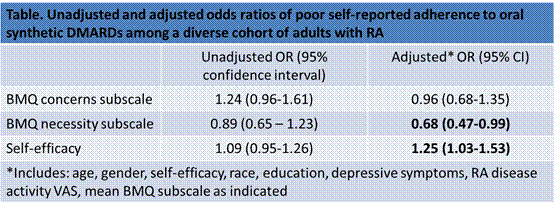Session Information
Session Type: ACR Poster Session C
Session Time: 9:00AM-11:00AM
Background/Purpose:
Adherence to disease-modifying
anti-rheumatic drugs (DMARDs) among rheumatoid arthritis (RA) patients ranges
from 30% to 107%, leading to potential adverse outcomes. Patient beliefs about
medications and self-efficacy have been associated with decision-making and
adherence. The aim of this study was to assess the association among medication
beliefs, self-efficacy, and adherence to oral DMARDs among diverse populations
with RA.
Methods:
Data were derived from RA patients
enrolled in a longitudinal observational cohort (Rheumatoid Arthritis Outcomes
Study; RAOS). Subjects completed a telephone interview in 2012-2013 in English
or Spanish that included measures of self-reported adherence (missing ≥1 dose in past week was considered to be poor
adherence) and the Beliefs about Medicine Questionnaire (BMQ). The BMQ consists
of two 5-question subscales (specific necessity scale and specific concerns
scale), which are scored from 1 to 5 (agree strongly to disagree strongly),
summed and averaged. Higher scores indicate greater belief in medication
necessity or stronger concerns (e.g., beliefs about potential long-term effects
of taking medication). Logistic regression was used to estimate the association
of poor adherence with the BMQ subscales, with and without adjustment for
depressive symptoms, self-efficacy (Self-Efficacy for Managing Chronic Disease
6-item Scale), demographics (race/ethnicity, age, gender, education) and RA
disease activity (global assessment).
Results:
Of 438 patients, 88% were
female, 29% Latino, mean age 61±13 years,
32% had high school education or less, 75% reported taking a synthetic DMARD.
Only 14% reported poor adherence to oral DMARDs. In terms of medication
beliefs, 64% reported that having to take medicines worries them, 81% reported
they sometimes worry about long-term effects of medicines, and 47% reported
worrying about becoming dependent on their medicines. However 91% agreed with
the statement “my health, at present, depends on my medicines” and 92%
agreed that “my medicines will protect me from becoming worse.” In
multivariate analyses, the BMQ necessity score – but not the concerns subscale – was associated with lower odds of poor adherence.
Self-efficacy conversely was associated with higher odds of poor adherence
(table).
Conclusion:
In a diverse cohort of patients
with RA, our data suggest that patients who report stronger beliefs in the
necessity of medication are more likely to adhere to their DMARDs. Higher
self-efficacy scores were associated with greater odds of poor adherence.
Given the often sub-optimal adherence to DMARDs, providers can play an
important role in enforcing positive patient beliefs about medications to improve
adherence and ultimately health outcomes. Further research is needed to
explore how best to inform positive medication beliefs among diverse
populations with RA.
To cite this abstract in AMA style:
McCulley C, Katz PP, Trupin L, Yelin EH, Barton J. Association of Medication Beliefs, Self-Efficacy, and Adherence in a Diverse Cohort of Adults with Rheumatoid Arthritis [abstract]. Arthritis Rheumatol. 2015; 67 (suppl 10). https://acrabstracts.org/abstract/association-of-medication-beliefs-self-efficacy-and-adherence-in-a-diverse-cohort-of-adults-with-rheumatoid-arthritis/. Accessed .« Back to 2015 ACR/ARHP Annual Meeting
ACR Meeting Abstracts - https://acrabstracts.org/abstract/association-of-medication-beliefs-self-efficacy-and-adherence-in-a-diverse-cohort-of-adults-with-rheumatoid-arthritis/

